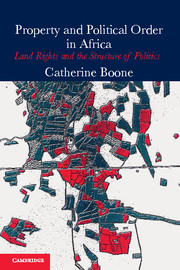Book contents
- Frontmatter
- Dedication
- Contents
- List of Figures, Tables and Maps
- Preface and Acknowledgments
- 1 Introduction
- Part I Property Rights and the Structure of Politics
- Part II
- Part III
- Political Scale
- 6 Land Conflict at the Micro-Scale: Family
- 7 The Local State as an Arena of Redistributive Conflict
- 8 Land Conflict at the National Scale
- Part IV
- Appendix Land Politics Cases and Sources
- References
- Index
6 - Land Conflict at the Micro-Scale: Family
Published online by Cambridge University Press: 05 June 2014
- Frontmatter
- Dedication
- Contents
- List of Figures, Tables and Maps
- Preface and Acknowledgments
- 1 Introduction
- Part I Property Rights and the Structure of Politics
- Part II
- Part III
- Political Scale
- 6 Land Conflict at the Micro-Scale: Family
- 7 The Local State as an Arena of Redistributive Conflict
- 8 Land Conflict at the National Scale
- Part IV
- Appendix Land Politics Cases and Sources
- References
- Index
Summary
The truth is that we are at a turning point. Today,…no reserve of land remains, so any accumulation of land can only take place by a redistribution within the village community.…A new chapter in the history of peasant societies in Niger is beginning to be written.
(Raynaut 1988, 235–236)Pressure on the land is overwhelming.
(Ontita 2007, 37)The Kisii region of western Kenya has one of the highest rural population densities in all sub-Saharan Africa. Landholdings were consolidated under the control of Gusii lineage heads during the colonial state-formation period of the 1920s and 1930s. In the 1960s, the government broke up the clan-based or lineage holdings and registered land in the names of patriarchs who presided over extended families composed of their wives (often two or three), children, and grandchildren. During the next five decades, Gusii elders divided the original landholdings (often 40–50 acres in size) among their sons who have, by now, subdivided the land again. In this region of Kenya, the land frontier is closed. High population growth rates, combined with the low rates of increase in off-farm and national employment opportunities, have placed “overwhelming population pressure on the land.”
This is a region experiencing classic “agricultural involution” as described by Clifford Geertz: rates of increase in the productivity of labor are falling as families invest more and more labor for declining returns on ever-shrinking land parcels. Kisii is an example of a neocustomary land tenure regime (LTR) centered on lineage- or family-based authority over land, in a situation of acute land scarcity and high ethnic homogeneity. In these respects, it is similar to areas featured in some of the best-known studies in the African land-politics literature, including Kojo Amanor's (1999) studies of Akim region of Ghana, Pauline Peters's study of southern Malawi (2004), André and Platteau on northwest Rwanda (1998), Fiona MacKenzie on Meru (1998), and a long tradition of work on Kenya's Central Province (Berman and Lonsdale 1992, for example).
- Type
- Chapter
- Information
- Property and Political Order in AfricaLand Rights and the Structure of Politics, pp. 188 - 199Publisher: Cambridge University PressPrint publication year: 2014



